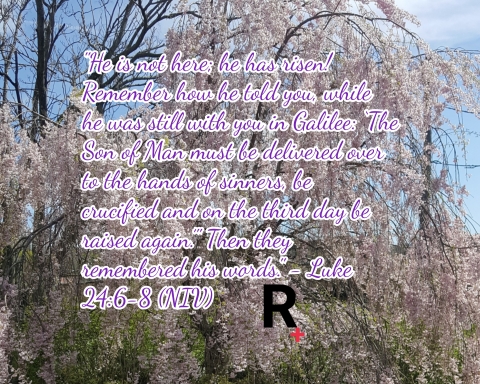“As a father shows compassion to his children,
so the Lord shows compassion to those who fear him.
For he knows our frame;
he remembers that we are dust.
As for man, his days are like grass;
he flourishes like a flower of the field;
for the wind passes over it, and it is gone,
and its place knows it no more.
But the steadfast love of the Lord is from everlasting to everlasting on those who fear him,
and his righteousness to children’s children,
to those who keep his covenant
and remember to do his commandments.
The Lord has established his throne in the heavens,
and his kingdom rules over all.” – Psalm 103:13-19 (ESV)
It was one
of those sleepless nights where I lay wide awake.
Many
thoughts running through my mind.
Among them
were things I remembered.
I remember
the pink bubble gum smelling surgery mask.
An oxygen
mask, really.
I remember
being in the hospital room with my parents,
waiting for
what I later would learn was for surgery
on both of
my ears.
I remember a
small boy my age,
who was
given the same mask.
We took
turns talking about, exchanging, and smelling each other’s
bubble gum scented
masks.
I remember
the metallic, strange odor underneath the bubble gum
scent, a
scent that no amount of fragrance could erase.
I remember
his parents were there, too.
Smiling at
their boy.
Watching us.
Their hid their
worries well.
I don’t really recall his name.
I remember he had brown hair.
I don’t recall the color of his eyes. What
color were they?
It’s troubling to me that I’m
unsure if they
were a deep brown or a clear blue.
I don’t recall a lot of things.
I remember that he was the first to
go out
with the surgeons.
His parents huddled together by the
door as they
bravely smiled, waved good bye, and
told him
they would see him soon.
I remember when it was my turn,
I was scared, I cried.
On the bed, oxygen mask put on me.
One surgeon said, “Don’t cry.
Remember your
new friend (from waiting room)
_____? He’s fine. You’ll be okay.”
Was his name John? I remember cold
cotton rubbed on my back. A needle.
The bubble gum metallic gas smell.
I remember crying while fading out.
What was his name, is he well?
I remember you, I hope to see you
well.
NOTE: This is about my experience having surgery done for the first time as a young girl. My parents wanted to help preserve my hearing – not that it mattered. I still went through stages of gradual hearing loss. By 7th grade and onward, my hearing loss became profound.
Life is not easy, but I know God remembers. I honestly have not thought of that boy and my experience there for a long time. I remember after the surgery, I was discharged. Went home. After a while, there was deep bone ache in my ears, but far deeper. It eventually went away as I healed, but that ache is what I also remember. When the painkillers wore off, I felt that ache.
The Bible says that God remembers us. He remembers how weak we are, that we don’t really last long. He never will take his love away from us.
He knows our pain.
My hope and prayer is that I get to
meet that boy I met in the waiting room. I hope that he’s doing well, and that
he and his parents are alive and happy. I hope that he’s healthy, and that God
will continue to show His goodness to them.
Why did I share this experience? Because of this verse:
“Each heart knows its own bitterness, and no one else can share its joy.” – Proverbs 14:10 (NIV)
But God understands every single thing we went through. Even if there isn’t anyone else in this world that understands you, He does. A lot of our suffering and struggles can make us bitter. We also feel lonely. And yet –
“This High Priest of ours understands our weaknesses, for he faced all of the same testings we do, yet he did not sin.” – Hebrews 4:15 (NLT)
God remembers everything. He understands us more than we know. So talk to Him about it. May you know Him and be satisfied. May you continue to experience waves upon waves of His love and mercy all the days of your life. May He give the kind of contentment that you need. Know that the Lord is good. God bless!

